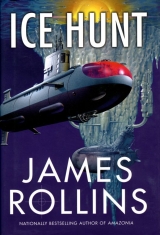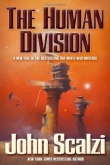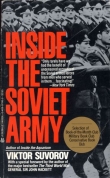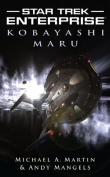
Текст книги "Ice Hunt"
Автор книги: James Rollins
Жанр:
Триллеры
сообщить о нарушении
Текущая страница: 29 (всего у книги 30 страниц)
Then it hit him. He suddenly understood why the glow at the center of the explosion had vanished. It was blocked from his view – by a wall of ice rolling toward him, as wide as the horizon.
As he stared, the cresting wave spread out from ground zero, like a boulder dropped into a still lake.
A tidal wave of ice.
His heart leaped to his throat as he ran for the idling helicopter. “Go!” he screamed as the world continued to rumble ominously. Instead of the explosion fading and echoing away, it was growing louder.
He fled to the Seahawk’s door.
One of his men pushed the door open. “What’s happening?”
Wilson dove in. “Get this bird in the air! Now!”
The pilot heard him. The rotors immediately began to kick up, spinning faster, rotating toward lift off.
Wilson dove to the copilot’s seat.
The blast wave of ice raced toward them.
He stared upward, praying. Overhead, the rotors spun to a blur. The Seahawk lifted from its skids, bobbling a bit as the rotors dug at the frigid air, trying to find purchase.
“C’mon!” Wilson urged.
He stared as the horizon closed in on them.
Then the bird took to the air, shooting straight up.
Wilson judged the distance of the surging ice-tsunami. Was its speed slowing? Fading?
It seemed to be.
It was!
They were going to make it.
Then a half mile away, something blew under the ice. The entire cap slammed up at them, striking the skids of the helicopter. It tilted savagely.
Wilson screamed.
The amplified wave struck the helicopter, swatting it out of the sky.
9:18 P.M.
USS POLAR SENTINEL
Amanda stared at the screen of the DeepEye. A moment ago, the monitor’s resolution had fogged from a deep sonar pulse, wiping out detail. Then worse – the screen went suddenly blue.
Only one effect registered that hue on a sonar device.
A nuclear explosion.
John Aratuk stood beside her. The elderly Inuit maintained his vigil in the Cyclops room. He stared up through the dome of Lexan glass. The seas lay dark around them. They were nearly at crush depth. Here the world was eternally sunless.
John pointed.
A star bloomed in the darkness. Off to the south, high above.
Ground zero.
The old man turned to Amanda. He didn’t speak. He didn’t have to. His grief was plain in every line of his face. He had aged decades in a single moment.
Amanda spoke. “I’m so sorry.”
He closed his eyes and turned away, inconsolable.
Amanda turned back to the DeepEye. The man’s daughter, all the others, they had sacrificed everything in an attempt to save the world.
But had they wasted their lives?
The Polaris trigger had blown. That was plain on the DeepEye monitor. But what of Amanda’s attempt to block the two amplifiers?
She stared at the blued-out screen. Her idea had been a simple one, employed rapidly. She had ordered the Polar Sentinelto dive deep. She needed distance from the surface.
As the submarine had plummeted into the Arctic depths, she had rapidly punched in the coordinates and aligned the DeepEye toward the locations of the two nearest amplifiers in the array. Once it was deep enough, she had pointed the DeepEye and widened the breadth of the sonar cone to encompass both devices, needing the distance and depth to accomplish this. Then she had turned the full strength of the DeepEye upon the pair of amplifiers and prayed.
For Polaris to work, the array had to propagate a perfect harmonic wave, just the right frequency to generate an ice-shattering effect. But if the DeepEye was transmitting across the wave front, it could alter the harmonics just enough to disrupt and perhaps jangle the wave front from igniting the two amplifiers within the DeepEye’s cone.
Amanda stared over at the monitor, waiting for it to clear.
Had her plan worked?
9:18 P.M.
RUSSIAN I-SERIES SUB
Burrowed between two mattresses, Jenny clung to Matt. The world cartwheeled around them both, not smoothly, but jarringly, like a paint shaker. Even with the cushioning, she felt battered and bruised. Her head rang from the concussion of the explosion.
But she was still alive.
They both were.
Matt hugged her tight, his legs and arms wrapped around her. “We’re heading down,” he yelled in her ears.
She also felt the increasing pressure.
After a long minute, the world slowed its spin, settling out into a crooked angle.
“I think we’ve stabilized.” Matt slid an arm from her and peeled away one edge of the mattress to peek out.
Jenny joined him.
In a berth across from them, Kowalski had already poked his head out. He waved a field flashlight up and down the crew quarters. The floor was tilted down and canted to the side, still rolling slightly. “Is everyone okay?” he called out.
Like butterflies leaving cocoons, the rest of the party emerged. Muffled barking confirmed Bane’s status.
Magdalene cried from farther back. “Zane…he fell out…!”
Zane answered faintly from the other direction, “No, I’m okay. Broke my wrist.”
Everyone slowly crawled free, checking their own limbs. Washburn carried Maki. She sang softly to the child, soothing him.
Tom worked his way up the narrow passage between the stacked bunks. His eyes were on the walls and ceilings. Jenny knew why. She heard the creak of seams, the pop of strained joints. “We’re deep,” he muttered. “The explosion must have thrust us straight down.”
“But at least we survivedthe explosion,” Ogden said.
“It was the ice around the sub,” Tom said dully. “It shielded us. The hollow sea cave was a structural weak point of the station. It simply shattered away, carrying us with it.”
“Are we going to sink to the bottom?” Magdalene asked.
“We’ve positive buoyancy,” Tom answered. “We should eventually surface like a cork. But…”
“But what?” Zane asked, cradling his arm.
All of the Navy crew stared at the walls as they continued to groan and scrape. Kowalski answered, “Pray we don’t reach crush depth first.”
9:20 P.M.
UNDER THE ICE…
With a start, Craig woke in darkness, upside down. He tasted blood on his tongue, his head ached, and his shoulder flared with a white-hot fire. Broken clavicle. But none of this stimulation woke him.
It was the spray of cold water in his face.
In the darkness, it took him a moment to orient himself. As he righted himself, his hands reached out to glass walls. He felt the source of the jetting spray. A crack in the tank’s glass door. The water was ice-cold.
His eyes strained for any sign of where he was. But the world remained as dark as oil. Water rose under him, filling the tank. He could hear the bubble of escaping air. The tank was no longer intact. He had survived the shockwave of the bomb, but he was deep underwater.
And still falling.
The spray grew fiercer as the depth grew deeper.
Ice water soaked through him, thigh-high now. His teeth chattered, half from cold, half from shock, but mostly from growing panic.
He secretly feared being buried alive. He had heard tales of agents being eliminated in such a manner.
This was worse.
The cold rose through him faster than the water. Which would kill him first, he wondered, hypothermia or drowning?
After a full minute, the answer came.
The loud bubbling stopped, and the spray of water slowed to a trickle, then stopped. He had reached some equilibrium point. The pocket of air was holding the water back…at least for now.
But he was far from safe. The small pocket would quickly stale, and even before that, the cold would kill him.
Or maybe not.
Fingers scrambled into the pocket of his parka. The clink of glass sounded. His fingertips touched broken glass, cutting. Still, he searched and found what he sought. He pulled out one of the glass syringes, unbroken. He had taken two samples from the ice lab, insurance at the time.
Now it was survival.
He thumbed off the needle cap.
There was no way he could find a vein in the dark.
With both hands, he stabbed the long point into the flesh of his belly. The pain was exquisite. He shoved the plunger, pushing the elixir into his peritoneal cavity. From there, it should slowly absorb into his bloodstream.
Once emptied, he pulled the syringe free and dropped it into the icy pool at his waist. His teeth chattered uncontrollably, his limbs soon followed.
A fear rose through his panic.
Would the cryogenic elixir absorb fast enough?
Only time would tell.
9:21 P.M.
RUSSIAN I-SERIES SUB
Holding his breath, Matt stood with the others. The old sub groaned and popped. Kowalski swung his flashlight up and down the passage. Distantly a soft hiss of water whispered in the boat. A leak. The darkness pressed down upon them.
Jenny held his hand, fingers tight, palms damp.
Then Matt felt the shift under his legs, a slight rolling of his stomach. He turned to Kowalski and Tom, trusting the Navy men’s senses more than his own.
Tom confirmed his hope. “We’re rising.”
Jenny’s fingers squeezed his. They were heading back up.
Murmurs of relief echoed among the others.
But Kowalski’s face remained tight. Tom did not look any more relieved.
“What’s wrong?” Matt asked.
“There’s no way to alter our buoyancy,” Tom answered.
Kowalski nodded. “It’s an uncontrolled ascent. We’re going to keep climbing faster and faster.”
Matt understood, remembering Tom’s earlier analogy. The sub was like a cork shoved deep into the water. It was now back on its way up, gaining speed, propelled by its own buoyancy. Matt’s gaze drifted up, picturing what would happen.
Once they reached the surface, the speed of their ascent would be deadly. They’d strike the underside of the polar ice cap like a train wreck.
“Back into the mattresses?” Matt asked.
“That won’t do much good,” Kowalski said. “It’ll be pancake city once we hit the surface.”
Still they had no other recourse. The party fled back to the padding and security of the mattresses. Matt pushed in next to Jenny. He sensed their rate of ascent accelerating. He felt it in his ears, a popping sensation. The incline of the sub grew steeper as it rose.
Jenny sought him with her hands. He curled into her, not knowing if this would be his last chance to do so. His hands reached to her cheeks. They were damp.
“Jen…”
She shook in his arms.
“I love you,” he whispered. “I always have. I never stopped.”
Her body quaked with silent sobs, but still she reached him with her lips, seeking his mouth. She kissed him deeply, hugely. She didn’t have to speak. She answered with her entire body and soul.
They clung to each other, shutting out the world, the terror. Here, in this moment, there was only forgiveness and love and simple need. One for another. How could they have forgotten something so simple?
The moment stretched to a crystalline eternity.
Then the sub hit the surface.
9:23 P.M.
ABOVE THE ICE…
The moon was full, a bright coin breaking through the storm clouds. Its light cast the Arctic stillness into silver, shining off the ice. The only blemish was a half-mile-wide dark hole, still smoldering and smoking. The rest of the world remained a perfect plain of sterling silver.
But it was not to last. Perfection never did.
A mile from the hole, something smashed through from below, a black whale breaching from the water. It thrust itself high into the air, leaving the seas fully behind. It hung in the air until gravity claimed it again.
The length of iron and steel crashed, belly first, to the sea, vanishing under the ice for a moment, then rolling back up, sloshing and rocking in the slush.
9:24 P.M.
RUSSIAN I-SERIES SUB
Matt lay in a tangle with Jenny. In the darkness, pressed between mattresses, it was hard to say whose limbs were whose.
A moment ago, they had struck the surface. They must have. Locked in each other’s arms, they had been thrown upward, held weightless for a long breath as if they were flying. Then they were inexplicably falling again.
The crash jarred them back to their berth, landing them in a pile.
Cries of surprise reached them from the others.
The sub rolled and canted.
Matt extracted himself from Jenny and helped them both from their nest. His feet were unsteady – or was it the rocking sub? Matt kept one hand clutched to the frame of his berth. “What just happened?” he asked.
Kowalski scratched his head with his flashlight. “We should be dead. Crushed.” He sounded oddly disappointed, his firm faith in the physics of buoyancy and ice betrayed.
“Well, I’m not complaining,” Matt said, gaining his balance as the sub settled. “Let’s see where we are.”
Keeping a firm grip on Jenny’s hand, he led the party back to the center of the boat. The inner hatch was unlocked. It dropped open, drenching Kowalski with water.
“Crap,” he swore. “Why am I the one always getting soaked?”
Matt climbed the ladder to the top of the boat’s sail, cracking the upper hatch of the conning tower. He threw it open with a clang. Cold air swept over him. He had never felt anything more wonderful.
He climbed out to the flying bridge to make room for the others below. As he stood, he gaped at the sight beyond the submarine.
The storm had broken. Moonlight turned the world silver.
But it wasn’t solidsilver.
The submarine lolled in a sea of slush. Ripples spread out from the rocking boat. A hundred yards away, the gentle waves lapped against a shore of solid ice. It marked the boundary between two worlds – one of regular ice and one of decomposed slush.
Matt stared out. A huge black hole separated these two worlds.
Jenny joined him, slipping her hand back into his. “What happened?”
“The Polaris Array did what it was supposed to do,” he said, waving a hand over the vast sea of slush and broken ice. “But it was only half a success. It looks like the other half of the array didn’t blow.”
“Was it the Polar Sentinel?”
Matt shrugged. “Who else could it be?”
Kowalski echoed Jenny’s words. “The Polar Sentinel.”
Matt glanced to him. He was pointing out into the slushy sea. A black bulk shoved upward, shedding ice as it rose. The submarine’s large eye, aglow from the lights inside, stared back at them, as if surprised to see them alive.
Matt pulled Jenny under his arm, recognizing how well she fit against him, two becoming one once again.
He had to admit, he was surprised, too.
Epilogue
ONE YEAR LATER, MAY 14, 6:34 A.M.
BROOKS RANGE, ALASKA
It was too damn early.
Matt burrowed under the worn quilt comforter, refusing to forsake the warmth beneath the thick down. Though it was already spring, mornings in the Alaskan high country were as cold as any Midwestern winter. He sought the warmest spot in the bed, next to his wife’s naked body.
He spread his length next to Jenny, spooning against her, skin to skin, nuzzling her neck, legs entwining.
“We already had your honeymoon last night,” she murmured into her pillow.
He grumbled but was unable to squash his smile. He had not stopped grinning like a love-addled teenager since he had spoken his vows beside the river yesterday afternoon. It had been a small ceremony. A few friends and family.
Amanda and Greg had flown in, newly married themselves. Captain Perry had been decorated for his heroics up north. Though half the polar ice cap had been destroyed by the Polaris Array, the other half had been preserved through his efforts and Amanda’s timely use of the DeepEye sonar.
As for the cap’s actual damage, it was significant but not irreparable. Each year, over the course of a summer, the cap normally melted in half anyway, yet recovered in winter, proving the earth’s remarkable resilience. The same proved true again. Over the past winter, the cap had re-formed, spreading intact over the northern seas once again.
However, the healing of the two governments – Russia and the United States – was neither as easy, nor as quick. Throughout the halls of power in Washington and Moscow, repercussions and punishments still rattled. Daily hearings, judicial inquiries, and military court-martials continued. But even this turmoil would eventually subside, freeze over.
Matt only hoped that something better came of it all.
As to what happened in the north, there was no sign. The schematics for the Polaris Array were never found, destroyed by Admiral Petkov before he ever left port. And the grendels were gone, too, wiped out in the nuclear blast.
In the end, the war had no lasting result.
Well, almostno result…
Laughter again echoed out from the main room of the family cabin. It was the pure delight that only a child could call forth. It was this merriment that had awakened Matt from his short sleep.
Jenny stirred this time. “It sounds like Maki’s up.”
The clank of pots and pans sounded from the neighboring room, too. Matt pulled the cover back, ready to shout for another couple hours of sleep. Then the aromas reached him. He inhaled deeply, sighing.
“Coffee…that’s not playing fair.”
Jenny rolled against him, sitting. “I guess we should be getting up.”
Matt shifted to one elbow. He stared at his new wife, sunlight streaming through the window, bathing her. He was the luckiest man in the whole damn world.
Childish giggles again drifted to them.
Jenny smiled at the sound. There was not even a hint of old sorrow. Like her, he knew how good it was to hear laughter again in the cabin, if even for only a short time.
Together, they slipped into pajamas and robes, then crossed to the bedroom door. Matt opened the way for her, then followed her out.
Maki was in the middle of the room, playing with Bane. The large wolf mix lay sprawled on his back, his belly exposed to be petted. The boy would scratch it, but when he reached the sweet spot, Bane’s back leg would twitch and scratch reflexively. This triggered another peal of laughter.
Matt smiled at the simple pleasure. A boy and a dog.
“You’re up!” a voice spoke from the kitchen. It was Belinda Haydon.
“Where’s your husband?” he asked.
“Bennie and Jen’s dad headed out with their poles an hour ago.”
Maki climbed to his feet. He crossed to the kitchen. “Mama,” he said in Inuit. “Can I have a Pop-Tart?” This last was in English. He was learning the language quickly.
“After you have your cereal, honey,” Belinda answered firmly.
Maki stuck out his lower lip and headed back to Bane.
Matt followed him with his eyes. After the ordeal a year ago, he and Jenny had considered adopting the boy, but they had too much to heal between themselves first. It was not a time for them to raise such a traumatized child.
Instead, the perfect family had been found for the boy: Bennie and Belinda. Jenny had told Matt about the couple’s miscarriage and infertility. The pair had enough love for ten children. If any two people could help the boy recover and grow, this was the couple.
Matt found himself staring at Jenny. And they could always have more children themselves. It was something they had already tentatively discussed, whispered in the night, sharing their hopes under the covers.
There was still time for all of them.
“Uncle Matt,” Maki called over to him, “Bane wants a Pop-Tart, too.”
Matt laughed.
Jenny smiled at him, at both of them.
He met her bright eyes.
He truly was the luckiest man in the world.
6:55 A.M.
UNDER THE ICE…
The tank rested on the ocean floor, full of water, crushed and cracked. The lone occupant was a frozen lump of bone and hardened tissue. There was no light. No sound.
None could hear the screaming inside the man’s head.
The cryoprotectant had worked, preserving and protecting him. But there was a side effect he had not anticipated. A horrible, monstrous side effect. The figure now understood the years the Russian scientists had spent researching sedatives and soporifics. Sleep drugs. The research was not ancillary, but critical to the suspended animation.
For the state created by the elixir was notsleep.
Consciousness remained – frozen, too, but intact.
Sleep was denied him.
He screamed and screamed, but even he heard nothing.
Deaf, dumb, blind.
Yet his body remained, preserved for all time. Deep in the black depths of the Arctic Ocean, one thought persisted as madness ate at what was left of him.
How long? How long is eternity?
Author’s Note
Over the past years, I have been asked many times about where the line lies between truth and fiction in my stories. So here at the end of Ice Hunt,I thought it might be interesting to share some of those details.
Let’s start at the beginning. The novel opens with a fictitious newspaper article detailing the disappearance of an Inuit village on Lake Anjikuni. The details of the tribe’s sudden and mysterious disappearance are based on fact. The fate of the poor people is, of course, of my own imagining. The same could be said for the story and fate of the unfortunate sailors aboard the Jeannetteback in 1881. The tragedy was real; the fate of the crew of the lone missing lifeboat is pure fiction.
As to the threat posed by the Polaris Array, this scenario is based on scientific theory, but the practical application of the star-shaped harmonic device was my own invention. The stated effect of such an annihilation of the northern polar cap – the creation of a new ice age – is also based on projections by leading Arctic researchers.
Now, as to the derivation of the “grendels,” the species is a blend of fact and fiction, too. The species Ambulocetus natans,known as the walking whale, has been documented in the fossil record. Additionally, the biological oddity of the Arctic wood frog is factual. These strange frogs do indeed freeze solid for months at a time, then revive upon thawing. Ken Storey of Carleton University has been researching the mechanism for this miraculous adaptation. The role of simple sugar in this “suspended animation” process is also factual, as is the singular and surprising fact about its genetic mechanism: that all vertebrate species carry these genes. I then mixed these facts and species to create the grendels.
Lastly, a comment on the one detail I thought would be the hardest for folks to believe: Could the United States, along with Russia, be involved with something as heinous as secret human experimentation? In the novel, Admiral Petkov states his case based on historical facts, but even he barely scratches the surface of the truth. So, as a cautionary note, let me end this book by documenting a partial list of historical abuses collated and copyrighted by the Health News Network (www.healthnewsnet.com):
1932The Tuskegee Syphilis Study begins. Two hundred black men diagnosed with syphilis are never told of their illness, are denied treatment, and instead are used as human guinea pigs. They all subsequently die from syphilis.
1935The Pellagra Incident. After millions of individuals die from pellagra over a span of two decades, the U.S. Public Health Service finally acts to stem the disease. The director of the agency admits it had known for at least twenty years that pellagra is caused by a niacin deficiency but failed to act since most of the deaths occurred within poverty-stricken black populations.
1940Four hundred prisoners in Chicago are infected with malaria in order to study the effects of new and experimental drugs to combat the disease. Nazi doctors later on trial at Nuremberg cite this American study to defend themselves.
1945Project Paperclip is initiated. The U.S. State Department, Army intelligence, and the CIA recruit Nazi scientists and offer them immunity and secret identities in exchange for work on top-secret government projects.
1947The CIA begins its study of LSD as a potential weapon. Human subjects (both civilian and military) are used with and without their knowledge.
1950In an experiment to determine how susceptible an American city would be to biological attack, the U.S. Navy sprays a cloud of bacteria from ships over San Francisco. Many residents become ill with pneumonialike symptoms.
1956The U.S. military releases mosquitoes infected with yellow fever over Savannah, Georgia, and Avon Park, Florida. Following each test, Army agents posing as public health officials test victims for effects.
1965Prisoners at the Holmesburg State Prison in Philadelphia are subjected to dioxin, the highly toxic chemical component of Agent Orange used in Vietnam. The men are later studied for development of cancer.
1966U.S. Army dispenses Bacillus subtilisvariant nigerthroughout the New York City subway system. More than a million civilians are exposed when Army scientists drop lightbulbs filled with the bacteria onto ventilation grates.
1990More than 1,500 six-month-old black and Hispanic babies in Los Angeles are given an “experimental” measles vaccine that had never been licensed for use in the United States. CDC later admits that parents were never informed that the vaccine being injected into their children was experimental.
1994Senator John D. Rockefeller issues a report revealing that for at least fifty years the Department of Defense has used hundreds of thousands of military personnel in human experiments and for intentional exposure to dangerous substances.
1995The U.S. government admits that it had offered Japanese war criminals and scientists who had performed human medical experiments salaries and immunity from prosecution in exchange for data on biological warfare research.
1995Dr. Garth Nicolson uncovers evidence that the biological agents used during the Gulf War had been manufactured in Houston, Texas, and Boca Raton, Florida, and tested on prisoners in the Texas Department of Corrections.
1996The Department of Defense admits that Desert Storm soldiers were exposed to chemical agents.
1997Eighty-eight members of Congress sign a letter demanding an investigation into bioweapons use and Gulf War syndrome.








